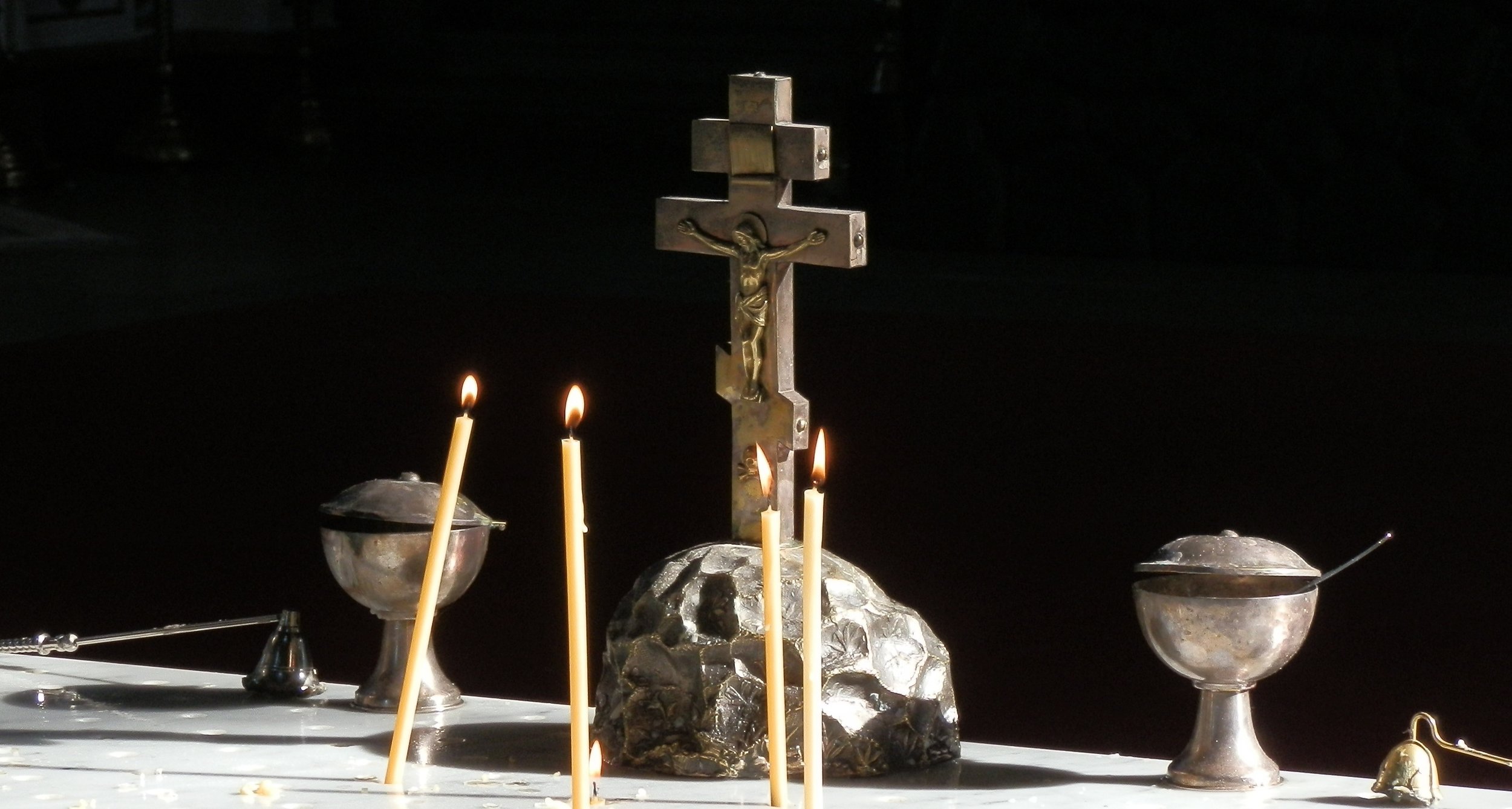Healing Atonement
Augustine of Hippo (354 - 430 AD)
An old clay oil lamp from Nazareth, Israel. Photo credit: Olivia Armstrong.
The Writings of Augustine of Hippo
Augustine of Hippo, On the Grace of Christ and on Original Sin, book 2, chapter 47 writes, "We men are all of us born in sin; our very origin is in sin; as you may read when David says, 'Behold, I was shapen in iniquity, and in sin did my mother conceive me.' Hence it is that Paul's flesh is 'a body of death;' even as he says himself, 'Who shall deliver me from the body of this death?' Christ's flesh, however, has condemned sin, which He experienced not by being born, and which by dying He crucified, that in our flesh there might be justification through grace, where previously there was impurity through sin."
Augustine of Hippo, Enchiridion, paragraph 41
Augustine of Hippo, Against Faustus the Manichean, book 14, paragraphs 3 - 6 seems to think that Mary's virginal conception eliminated some kind of sin in Jesus' humanity (the early error was to think that sexual desire even for one's spouse was sinful) but otherwise subscribes to medical substitutionary atonement
Augustine of Hippo, On Christian Doctrine, book 1, chapter 14
Augustine of Hippo, On the Christian Struggle (Orthumanitas blog, Mar 31, 2015)
More Resources on Augustine of Hippo
See also our Theology 101 and Theology 201 which highlight the shortcomings of Augustine
Thomas Weinandy, In the Likeness of Sinful Flesh (pdf book, 1993), p.29
Stanley P. Rosenberg, "Interpreting Atonement in Augustine," edited by Charles E. Hill and Frank A. James III, The Glory of the Atonement (Amazon book, 2004) notes that Augustine did not believe in penal substitution, despite the fact that the book was intended to be a collection of essays honoring penal substitution!
Father Seraphim Rose, The Place of Blessed Augustine in the Orthodox Church (Amazon book, Aug 2007) traces the texts and legacy of Augustine's doctrine of double predestination and selective grace
George E. Demacopoulos and Aristotle Papanikolaou, Orthodox Readings of Augustine (Amazon book, Oct 2008) examines Augustine's teachings with cautious optimism on some counts, incisive critiques on others
Mike Barlotta, Augustine's Evolving Views on Free Will (Evangelical Arminians, Mar 2, 2015) is a helpful start in looking at Augustine's early and later views; free will is compatible with medical substitution, and arguably incompatible with penal substitution
John Milbank, Why Study Augustine of Hippo (University of Nottingham, Jul 14, 2016) explains Augustine's error re: his definition of predestination and hell
Bobby Grow, Augustine's Theology of Atonement: Divine Child Abuse? (Evangelical Calvinist, Sep 26, 2016) responds to John McGuckin's presentation of patristic theology, but is an example of engaging penal substitution from the standpoint of ontological-medical substitution
James K.A. Smith, How Augustine Responded to the Problem of Evil Without Solving It (Christian Century, Oct 9, 2019) is accurate enough, but holds Augustine up as a role model, strangely and in my view erroneously. Unfortunately, Augustine’s theology of double predestination and differential grace functionally made God the author of sin, and therefore, evil. Augustine departed from the Greek patristic consensus about human free will being the logical result of God’s love.
Craig Truglia, Augustine and Fulgentius of Ruspe Contradict the Immaculate Conception (Orthodox Christian Theology, Aug 14, 2020)
Alister McGrath, Iustitia Dei: A History of the Christian Doctrine of Justification (Cambridge University Press, 4th edition 2020), p.48:
“Augustine develops this idea further, arguing that God, in healing humanity through the incarnation, has acted both as the administering physician and administered medicine. Christ is thus the ‘complete physician of our wounds (totus medicus vulnerum nostrorum) who transforms our natures and situations. In a powerful correlation of the doctrine of the incarnation and the image of Christus medicus, Augustine declares that, since we were unable to go to the physician for the healing of our multiple wounds and illnesses, the physician graciously chose to come to us instead. We are healed of our wounds, our infirmities, our unrighteousness, and our sin through the transformative work of Christ within us.”
James K.A. Smith, I’m a Philosopher. We Can’t Think Our Way Out of This Mess (Christian Century, Feb 25, 2021) “God’s revelation, [Augustine of Hippo] goes on to say, is not a message in a bottle, like bits of information sent across the abyss to be received by the intellect. Rather, God’s self-revelation is a magnet for desire. “This revelation is what draws. You show a green branch to a sheep and you draw her. Nuts are shown to a boy and he is drawn. And he is drawn by what he runs to, by loving he is drawn, without injury to the body he is drawn, by a chain of the heart he is drawn.”” Alas, if only Smith would acknowledge that it’s desire, not merit/demerit, all the way down.
Sources of Atonement Theology
These resources explore the foundation of “Medical Substitution” as the best understanding of the Bible, and the original understanding of the church. There are also links to books, web articles, etc. from representatives of the three broad Christian traditions.





